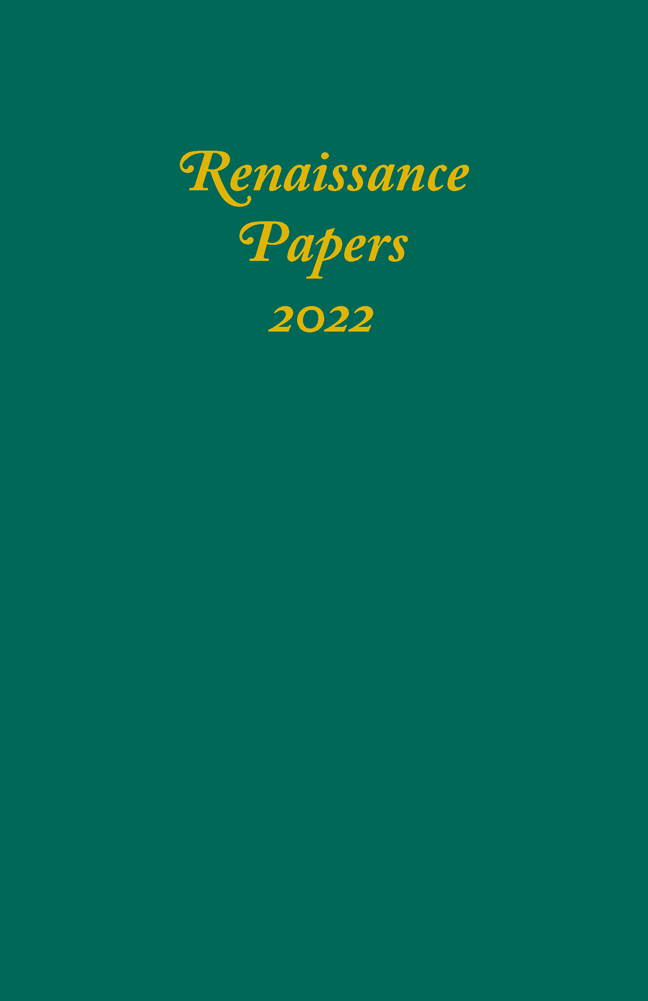Book contents
- Frontmatter
- Contents
- Dedication
- The Space of Hell, the Place of Print in Early Modern London
- The Jewish Bride and Oriental Concubine: Raphael's Donna Velata and La Fornarina
- Into the Abyss: Hans Holbein the Younger's Dead Christ
- Racialized Sacred Spaces: Narratives of Exclusion and Inclusion in Northern European Churches
- Place for Our Dead: Sacred Space and the Greek Community in Early Modern Venice
- Pantagruelion, Debt and Ecology: Ecocriticism and Early Modern French Literature in Conversation
- Race before Race in Edmund Spenser's Faerie Queene
- Materializing Lost Time and Space: Implications for a Transformed Scholarly Agenda
Pantagruelion, Debt and Ecology: Ecocriticism and Early Modern French Literature in Conversation
Published online by Cambridge University Press: 22 February 2024
- Frontmatter
- Contents
- Dedication
- The Space of Hell, the Place of Print in Early Modern London
- The Jewish Bride and Oriental Concubine: Raphael's Donna Velata and La Fornarina
- Into the Abyss: Hans Holbein the Younger's Dead Christ
- Racialized Sacred Spaces: Narratives of Exclusion and Inclusion in Northern European Churches
- Place for Our Dead: Sacred Space and the Greek Community in Early Modern Venice
- Pantagruelion, Debt and Ecology: Ecocriticism and Early Modern French Literature in Conversation
- Race before Race in Edmund Spenser's Faerie Queene
- Materializing Lost Time and Space: Implications for a Transformed Scholarly Agenda
Summary
Anachronistic as it might seem, Early Modern authors wrestled with several of the issues at the center of ecocriticism including humanity's relation to non-human nature and the potentially destructive effects that human activities can have on ecology. As one critic notes,
The modern constitution, premised on the new governability of culture apart from nature, originated in Bacon and Newton's science of mechanism and Hobbes's and Locke's realm of contract and commerce. The common people may still have believed it rained for decades in England because of the divorces of a king, but by the end of the English Revolution, the constitution and the cosmos were also divorced. […] After the Renaissance and the Reformation, humanity would arise as the new artificer of politics and of the machine; the world would be made new, as Bacon would claim, not in millennialist hopes of the end of history but in the power which science and the state would draw together in birthing the “new atlantis” and the novum organum.
It is arguable that the expulsion of both divinity and humanity from nature can be traced to thinkers of the Early Modern period whose works created a context in which nature became the object of a rational, mechanistic science and shaped the anthropocentric direction of modernity. Our ecological crisis developed against this background that separated culture from nature, subject from object and material bodies from a transcendent God.
It should not be surprising then, to find insightful reflections on ecological questions in the works of Early Modern authors. But instead of merely applying ecocritical tools to reread those texts— which in itself carries its own significance—it might be fruitful to try to explore what those Early Modern texts can add to our current conversations. Accordingly, in what follows, I will read Panurge's praise of debts and the praise of Pantagruelion from François Rabelais's Tiers livre in conversation with contemporary ecocritics whose work seems to resonate with his text and style.
For example, Timothy Morton's insistence that we address our ecological crisis through laughter and play resonates with Rabelais's comic style. Similarly, Rabelais's meditation on debt and the bonds that it forms finds echoes in Michel Serres's and Bruno Latour's interest in reconfiguring and expanding our understanding of how we are bound to other humans and also to nature.
- Type
- Chapter
- Information
- Renaissance Papers 2022 , pp. 77 - 88Publisher: Boydell & BrewerPrint publication year: 2023



